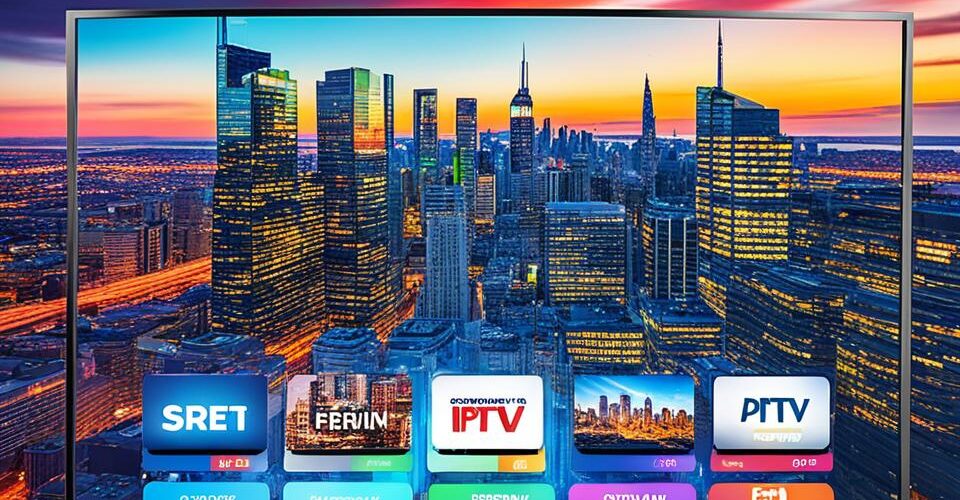Did you know that IPTV streaming is rapidly gaining popularity as an alternative to traditional cable and satellite TV? According to recent statistics, the number of IPTV users worldwide is expected to reach 160 million by 2025, marking a significant shift in how people consume television content.
Key Takeaways:
- Understand what IPTV is and how it differs from cable or satellite TV.
- Weigh the advantages and disadvantages of IPTV before making the switch.
- Consider important factors when choosing an IPTV service.
- Stay informed about the legal implications of IPTV streaming.
- Explore tips and tricks for optimizing your IPTV streaming experience.
What is IPTV?
IPTV refers to Internet Protocol Television, a groundbreaking technology that allows television signals to be delivered over the internet instead of through traditional cable or satellite methods. With IPTV, viewers can access a wide range of live TV channels and enjoy a more personalized viewing experience by accessing on-demand content. This internet television service has gained popularity, thanks to its convenience and versatility in offering a plethora of entertainment options.
“IPTV stands for Internet Protocol Television, a groundbreaking technology that allows television signals to be delivered over the internet instead of through traditional cable or satellite methods.”
Unlike cable or satellite TV, IPTV streaming takes advantage of an internet connection to transmit audio and video signals for seamless television viewing. By utilizing internet protocols, IPTV provides a cost-effective and flexible solution to traditional broadcasting, opening up a whole new world of entertainment possibilities.
With an IPTV service, users can expect a vast selection of live TV channels, including international broadcasts, sports events, news updates, and much more. Additionally, many IPTV providers offer video on demand options, allowing subscribers to watch their favorite movies, TV shows, and other content whenever they want.
IPTV streaming presents viewers with the freedom to enjoy their favorite programs on different devices, such as smart TVs, smartphones, tablets, and computers. This level of accessibility ensures that users can enjoy their favorite shows on the go, without being confined to a traditional TV setup.
To better understand the concept of IPTV, let’s take a closer look at its key components:
- IPTV Definition: IPTV stands for Internet Protocol Television, which refers to the delivery of television content over the internet rather than traditional broadcasting methods.
- IPTV Service: An IPTV service is a subscription-based offering that grants access to live TV channels and on-demand content through the internet.
- Internet Television: Commonly known as IPTV, internet television allows users to stream television content directly over an internet connection without the need for traditional cable or satellite subscriptions.
- IPTV Streaming: IPTV streaming refers to the process of transmitting television signals over the internet, allowing viewers to watch their favorite programs in real-time or on-demand.
“IPTV streaming presents viewers with the freedom to enjoy their favorite programs on different devices, such as smart TVs, smartphones, tablets, and computers.”
IPTV has revolutionized the way we consume television content by offering a flexible and interactive viewing experience. The ability to access a diverse range of channels and on-demand content makes IPTV a popular choice for cord-cutters and entertainment enthusiasts alike.
To complement this section, here’s a visually appealing and relevant image:
| IPTV | Cable TV | Satellite TV |
|---|---|---|
| Delivered over the internet | Requires physical cable infrastructure | Requires satellite dish installation |
| Wide selection of channels and on-demand content | Limited channel options | Limited channel options |
| Compatible with various devices | Requires cable box or set-top box | Requires satellite receiver |
| Flexible and customizable viewing experience | Subject to package limitations | Subject to package limitations |
Advantages and Disadvantages of IPTV
IPTV, or Internet Protocol Television, provides several benefits that have made it a popular choice for television streaming. However, like any technology, IPTV has its pros and cons. In this section, we will explore the advantages and disadvantages of IPTV to help you make an informed decision.
Advantages of IPTV
- Lower Costs: One of the key advantages of IPTV is its cost-effectiveness. Compared to traditional cable or satellite TV subscriptions, IPTV services often offer lower monthly fees, saving you money in the long run.
- Access to Exclusive Content: IPTV allows you to access a wide range of live TV channels and on-demand content that may not be available through traditional broadcasting methods. This gives you access to a more diverse selection of programming.
- On-Demand Viewing: With IPTV, you have the flexibility to watch content on-demand. This means you can catch up on your favorite shows or movies at your convenience, without being tied to a fixed broadcasting schedule.
Disadvantages of IPTV
- Buffering Issues: IPTV streaming heavily relies on internet connectivity. If you have multiple devices connected to the internet simultaneously, it may lead to buffering issues, affecting the quality of your viewing experience.
- Lack of Regulation: Unlike traditional cable or satellite TV providers, IPTV services are not subject to the same level of regulation. This can result in variations in the quality and reliability of IPTV services, with some providers offering subpar experiences.
It’s important to carefully consider the advantages and disadvantages of IPTV before deciding whether it is the right choice for your entertainment needs. Despite the drawbacks, IPTV’s cost-effectiveness, access to exclusive content, and on-demand viewing are significant benefits that have attracted many users.
To further understand the advantages and disadvantages of IPTV, let’s take a look at a comparative table below:
| Advantages of IPTV | Disadvantages of IPTV |
|---|---|
| Lower Costs | Buffering Issues |
| Access to Exclusive Content | Lack of Regulation |
| On-Demand Viewing |

By carefully weighing the advantages and disadvantages, you can make an informed decision about whether IPTV is the right choice for your television streaming needs.
What to Look for in an IPTV Service
When it comes to selecting the right IPTV service, there are several key factors to consider. To ensure that you have the best streaming experience possible, pay attention to the following aspects:
1. IPTV Channel Selection
One of the primary advantages of IPTV is the wide range of channels it offers. Look for a service that provides a diverse selection of channels to cater to your specific interests. Whether you’re a sports enthusiast, movie lover, or prefer international content, choose a provider that offers a comprehensive channel lineup.
2. IPTV Video on Demand
Having access to a robust library of on-demand content is another important feature to look for. This allows you to watch movies, TV shows, and other videos at your convenience. Make sure the IPTV service you choose offers a vast collection of video on demand content to enrich your viewing experience.
3. IPTV Stream Quality
The quality of the streaming experience is crucial for an enjoyable IPTV experience. Look for a provider that offers high-definition streams and considers factors such as buffering and smooth playback. A service with reliable stream quality ensures that you can watch your favorite content without interruptions or pixelation.
4. IPTV ISP Blocking
Some Internet Service Providers (ISPs) may block certain IPTV services, leading to restricted access. Choosing a provider that offers advanced technology to overcome ISP blocking ensures that you can enjoy uninterrupted streaming. Look for services that provide strategies to bypass ISP restrictions and maintain a stable connection.
5. IPTV Support
Having reliable customer support is crucial when selecting an IPTV service. Whether you encounter technical issues, have billing concerns, or require assistance with setting up your IPTV, a responsive and dedicated support team can make a significant difference. Look for providers that offer 24/7 customer support to address any concerns promptly.
By considering these factors when choosing an IPTV service, you can ensure a seamless and enjoyable streaming experience. Make an informed decision and select a provider that meets your specific needs and preferences.
Is IPTV Legal?
The legality of IPTV varies by country and is subject to copyright laws. While providing and reselling certain IPTV services without proper licensing is illegal, using IPTV for personal use is a legal grey area. It’s important to understand the laws in your country and use caution when streaming copyrighted content.
The use of IPTV falls within a legal grey area, making it essential to navigate the legal landscape carefully. The laws surrounding IPTV are complex and vary from country to country. While IPTV piracy and copyright infringement are illegal, the act of streaming copyrighted content for personal use is often considered a legal grey area.
To avoid the risk of copyright infringement or any legal repercussions, it is advisable to use IPTV services that have obtained necessary licensing. However, even with properly licensed IPTV services, it is always recommended to stream content responsibly and within the constraints of copyright laws.
“Using IPTV can present legal challenges, primarily in relation to copyright infringement. It’s crucial to stay informed about the laws in your jurisdiction and use legal IPTV options to avoid any potential legal issues.”
When accessing IPTV content, it is imperative to adhere to streaming laws and understand the potential copyright infringement implications. Streaming copyrighted content without proper authorization is illegal in many jurisdictions and can result in severe penalties, including fines and even imprisonment.
Legal implications of IPTV streaming:
- The distribution and reselling of unauthorized IPTV services without proper licensing is illegal.
- Streaming copyrighted content without proper authorization may constitute copyright infringement.
- Penalties for copyright infringement can include fines, legal action, and criminal charges.
- The legality of IPTV for personal use is a legal grey area and may vary by jurisdiction.
As a responsible user, it is important to be aware of the legal implications surrounding IPTV streaming and ensure compliance with copyright laws. Taking the necessary precautions can help you enjoy IPTV content while minimizing the risk of copyright infringement and legal consequences.

Do You Need a VPN for IPTV?
While using a VPN (Virtual Private Network) is not necessary for IPTV, it can provide added security and privacy for your IPTV streaming experience. A VPN encrypts your internet connection, hiding your IP address from prying eyes. This ensures that your online activities and personal information are kept confidential.
One of the key benefits of using a VPN for IPTV is the protection it offers against potential ISP throttling. Some Internet Service Providers may intentionally slow down your internet connection when they detect heavy streaming activities, leading to buffering issues and poor video quality. By using a VPN, you can bypass ISP throttling and enjoy a smoother IPTV streaming experience.
Moreover, a VPN allows you to access geo-restricted content while streaming IPTV. Many IPTV services offer a wide range of international channels, but some may be limited to specific regions due to licensing agreements. With a VPN, you can change your virtual location and access geo-restricted content from anywhere in the world.
“A VPN can provide added security, protect your privacy, and help you bypass content restrictions while streaming IPTV.”
It’s important to note that not all VPNs are suitable for IPTV streaming. When choosing a VPN for your IPTV needs, consider factors such as speed, server locations, and compatibility with your device. Look for a VPN provider that offers fast and stable connections, a wide range of server locations, and support for multiple devices.
Here are some key benefits of using a VPN for IPTV:
- Enhanced privacy and security for your IPTV streaming activities
- Bypassing ISP throttling for smoother streaming
- Access to geo-restricted content and international channels
- Protection against potential copyright infringement
While a VPN is not a requirement for IPTV, it can significantly improve your streaming experience and provide peace of mind when it comes to privacy and security.
IPTV Tips and Tricks
Optimizing your IPTV streaming experience involves implementing a few key tips and tricks. By following these recommendations, you can enhance your stream connection, reduce buffering issues, and ensure high-quality IPTV streaming.
1. Hardwire Your Device for a Stable Connection
Instead of relying solely on Wi-Fi, consider connecting your IPTV device directly to your router with an Ethernet cable. This hardwired connection provides a more stable and reliable internet connection, minimizing buffering and stream interruptions.
2. Adjust Stream Quality to Match Your Internet Speed
Streaming IPTV with a high-quality stream resolution can put strain on your internet bandwidth, leading to buffering and slow performance. To avoid this, adjust the stream quality settings within your IPTV app or device to match the capabilities of your internet connection. By selecting a lower resolution, you can ensure smoother playback and a consistent streaming experience.
3. Try Alternate Streams
If you encounter buffering or other issues with a specific IPTV stream, it can be beneficial to try alternate streams. IPTV services often provide multiple options for the same channel, allowing you to switch to a different stream that may offer better performance. This can help resolve buffering issues and ensure a more reliable stream connection.

Implementing these IPTV tips and tricks will greatly enhance your streaming experience while minimizing buffering and ensuring a high-quality stream connection.
Setting Up IPTV on Different Devices
Setting up IPTV on various devices can seem daunting, but with the right guide, it can be a seamless process. Whether you’re using Kodi, Android TV, or Amazon Fire TV, follow these step-by-step instructions to get IPTV up and running on your device:
IPTV Setup on Kodi
If you’re using the Kodi media player, here’s how you can set up IPTV:
- Open Kodi on your device.
- Go to the “Add-ons” section.
- Click on the “My Add-ons” option.
- Select “PVR Clients” from the list.
- Choose the IPTV Simple Client.
- Click on the “Configure” option.
- Enter the URL provided by your IPTV service provider.
- Save the settings and restart Kodi.
- You can now access IPTV channels through the “TV” section on Kodi.
With these simple steps, you’ll be able to enjoy IPTV streaming on Kodi.
IPTV Setup on Android TV
If you have an Android TV device, follow these instructions to set up IPTV:
- Go to the Google Play Store on your Android TV.
- Search for an IPTV app, such as “Perfect Player” or “GSE Smart IPTV”.
- Install the app on your device.
- Launch the IPTV app.
- Enter the URL or M3U playlist provided by your IPTV service provider.
- Save the settings and restart the app.
- You can now access IPTV channels through the app’s interface.
By following these steps, you’ll be able to enjoy IPTV on your Android TV effortlessly.
IPTV Setup on Amazon Fire TV
To set up IPTV on your Amazon Fire TV, here’s what you need to do:
- Go to the Amazon Appstore on your Fire TV device.
- Search for an IPTV app, such as “Perfect Player” or “TiviMate”.
- Install the app on your device.
- Launch the IPTV app.
- Enter the URL or M3U playlist provided by your IPTV service provider.
- Save the settings and restart the app.
- You can now access IPTV channels through the app’s interface on your Fire TV.
Setting up IPTV on Amazon Fire TV is a straightforward process with these instructions.
“Setting up IPTV on your preferred device doesn’t have to be complicated. With the right steps and instructions, you can enjoy a seamless IPTV streaming experience.”
Now that you know how to set up IPTV on popular devices like Kodi, Android TV, and Amazon Fire TV, you can start enjoying your favorite channels and content hassle-free.
Protecting Your Connection and Accessing All IPTV Content
When it comes to enjoying IPTV, security and privacy should be a top priority. Protecting your IPTV connection with a VPN (Virtual Private Network) is crucial to safeguard your online activities and ensure a safe streaming experience. A VPN creates a secure and encrypted tunnel between your device and the internet, making it impossible for anyone to intercept your data and monitor your online activities.
Setting up a VPN for your IPTV is a straightforward process. Here are the steps to follow:
- Choose a reliable VPN provider that offers fast and secure connections.
- Download and install the VPN app on your device.
- Launch the VPN app and sign in to your account.
- Select a server location from the available options. It is recommended to choose a server in a country where the IPTV content you want to access is available.
- Click the connect button to establish a secure VPN connection.
- Once connected, your IP address will be masked, and your online activities will be protected.
Recommended VPN Providers
Here are some top VPN providers that offer excellent security, privacy, and reliable connections for IPTV streaming:
| VPN Provider | Features | Price |
|---|---|---|
| NordVPN | High-speed servers in various locations, strict no-logs policy, advanced security features. | $11.95/month |
| ExpressVPN | Fast servers worldwide, user-friendly apps, strong encryption. | $12.95/month |
| Surfshark | Unlimited simultaneous connections, ad-blocking feature, affordable pricing. | $12.95/month |
Remember to choose a VPN provider that offers servers in the countries where your desired IPTV content is accessible. Additionally, make sure to select a VPN with fast connections and a strict no-logs policy to ensure your privacy.
In addition to using a VPN, there are other tips to enhance your IPTV streaming experience and access all available content:
- Install IPTV addons or plugins for popular media players like Kodi to access additional content and streaming sources.
- Regularly update your IPTV app or media player to ensure you have the latest features and security patches.
- Optimize your internet connection by using a wired Ethernet connection instead of Wi-Fi, if possible.
- Adjust the video stream quality based on your internet speed to prevent buffering issues.
By taking these steps, you can protect your IPTV connection, ensure privacy while streaming, and access all the IPTV content you desire.
Conclusion
In conclusion, IPTV provides a compelling alternative to traditional cable and satellite TV. With its cost-effectiveness and flexibility, IPTV offers users a wide range of live TV channels and on-demand content. By choosing the right IPTV service and setting up the necessary equipment, viewers can enjoy their favorite shows and movies without the limitations of cable or satellite subscriptions.
However, it is essential to be aware of the legal considerations surrounding IPTV. While personal use of IPTV falls into a legal grey area in some countries, it is crucial to understand and respect copyright laws. Users should avoid accessing copyrighted content without proper authorization and use IPTV services responsibly.
To ensure a secure and uninterrupted streaming experience, it is advisable to protect your connection when using IPTV. Consider using a Virtual Private Network (VPN) to encrypt your internet connection, safeguard your privacy, and bypass potential limitations imposed by Internet Service Providers (ISPs). By taking these precautions, viewers can enjoy the full potential of IPTV while maintaining online security.
With the continuous advancements in technology, the future of IPTV looks promising. As more people seek alternatives to traditional TV subscriptions, IPTV is poised to become an increasingly popular choice. Its versatility, affordability, and vast content options make it a compelling option for those looking for a more personalized and flexible TV experience. As the demand for IPTV continues to grow, we can expect further advancements in streaming quality, channel selection, and user experience.
FAQ
What is IPTV?
What are the advantages and disadvantages of IPTV?
What should I look for in an IPTV service?
Is IPTV legal?
Do I need a VPN for IPTV?
What are some tips and tricks for IPTV streaming?
How do I choose the best IPTV service?
How do I set up IPTV on different devices?
How can I protect my IPTV connection and access all IPTV content?






